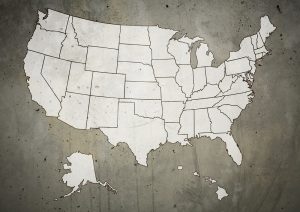Introduction to Bankruptcy andA�Community Property States
When it comes to filing bankruptcy as a married person, you have more options than you may think. Even as a married person you can still file individually a�� there is no requirement that you HAVE to include your spouse in a bankruptcy proceeding. Granted, the non-filing spouse could still feel the effects of the filing spouse but there are a lot of factors to consider when making this determination. A couple of major factors to be aware of and consider include actually qualifying for a bankruptcy petition as a married person (even if you file independently of your spouse), how the bankruptcy will affect your property and the martial property, and the exemptions that you can utilize during the bankruptcy proceeding to protect that property.
 First of all, in order to file for bankruptcy, you have to actually qualify to do so.[i] For a Chapter 7 bankruptcy filing the individual or couple must pass what is called a means test.[ii] The test looks at the income of each individual and compares that against the medium income for a similar household in that state.[iii] The calculation done is based off the income of both spouses, and logic would dictate that the median household income would be double for a couple as compared to an individual but it is not.[iv] In fact, the median household income for a two person household is only slightly more than that of a single individual household.[v] So even if you are married yet filing bankruptcy as an individual, your spousea��s income will still be taken into consideration.
First of all, in order to file for bankruptcy, you have to actually qualify to do so.[i] For a Chapter 7 bankruptcy filing the individual or couple must pass what is called a means test.[ii] The test looks at the income of each individual and compares that against the medium income for a similar household in that state.[iii] The calculation done is based off the income of both spouses, and logic would dictate that the median household income would be double for a couple as compared to an individual but it is not.[iv] In fact, the median household income for a two person household is only slightly more than that of a single individual household.[v] So even if you are married yet filing bankruptcy as an individual, your spousea��s income will still be taken into consideration.
Now if your income falls below the median number, that will automatically qualify you for the Chapter 7 bankruptcy filing.[vi] Note, this is just the filing phase a�� you must still go through with the bankruptcy proceeding to have your debts considered for discharge. Now, if the income amount surpasses the median number, then the determination of whether you can file for Chapter 7 bankruptcy becomes more complicated. Take Adam for example. If Adam made $35,000 a year and the median household income for a single individual in that state is $40,000 then Adam will automatically qualify. Now, if Adam was married and his spouse made $25,000 that would put their overall income at $60,000. Typically, the median income for the two-person household will only be slightly more than the median for a single household. so likely around $55,000. With that number set, Adam and his wife will no longer qualify automatically for Chapter 7 bankruptcy. They can however still go through the rest of the means test to see if they can qualify another way.
The next step Adam, or others who do not automatically qualify for Chapter 7 bankruptcy, is to look at the disposable income that is acquired each month.[vii] Disposable income is determined by looking at how much monthly income the household has, then subtracting out specific monthly expenses.[viii] After the specific monthly expenses have been taken out, whatever is left over is the disposable income.[ix] If your disposable income exceeds a given amount determined by that statea��s courts, then you will fail the means test and not qualify for Chapter 7 bankruptcy. This may seem unfair especially if you are living from paycheck to paycheck with no relief. Chapter 7 bankruptcy provides such a clean start from debtors, that the line has to be drawn somewhere for the creditors.
Once it has been determined that you qualify for Chapter 7 bankruptcy, you should note that you are not bound to going through with the bankruptcy proceeding.[x] On the flip side, if you do not qualify for Chapter 7 bankruptcy through automatic approval or through the means test, there are still other options a debtor can take, including Chapter 13 bankruptcy. Even though you will not be able to discharge your debt with Chapter 13 bankruptcy, the court ordered monthly payments over the following three to five years should help alleviate the financial burden for a least a temporary time period.
Do You Live in a Community Property or Common Law Property State?
Another important factor to consider when filing for Chapter 7 bankruptcy is whether you live in a community property state or a common law property state. This determination will play a major role with your property during the bankruptcy proceeding. Arizona is a community property state and so the laws affecting the property through the bankruptcy will inevitably be different. In a community property state, such as Arizona and California, the property that is acquired during the marriage is considered community marital property. This means that regardless of whose name is on the title the property is considered to be owned equally among the married couple.[xi] This also means that each spouse is equally financially responsible for that property. [xii]It is still possible for individual spouses to acquire separate property during the marriage. There are a few ways that this can be accomplished, such as through an agreement between the spouses. Another way is if one spouse individually receives an inheritance, that inheritance will be deemed separate property of that spouse. For the most part though, property acquired during the marriage in these states will generally be deemed community property by the court.

When it comes to filing for bankruptcy, all of the community property will be included in the bankruptcy proceeding even if you file as an individual.[xiii] In that scenario, a lot more property is going to be at risk during the proceeding than in other common law states.[xiv] One way to protect your property though bankruptcy for both individual and joint filings is through exemptions. In many states, there are certain exemptions that the state will allow you to a�?double up ona�? if you file jointly with your spouse. This is one major factor to consider when you make the decision to file together or separately from your spouse.
In Arizona, the courts will only allow couples to double the exemptions for their motor vehicle and for household goods.[xv] For motor vehicles, an individual can exempt up to $6,000 on one or more vehicles. So, if you file jointly with your spouse, you can exempt up to $12,000 on one or more vehicles and avoid losing your vehicles during the bankruptcy proceeding. For household goods the numbers vary depending on what goods you own and want to keep. You can view a list of exemptions through this PDF document.
One major difference between Arizona and other community property states in terms of exemptions, is that fact that Arizona will NOT allow you to double the homestead allowance.[xvi] The homestead allowance is for your home or property. Many states will allow a couple to double the exemption which provides a much greater blanket of protection. For instance, if your home is worth $250,000 and each spouse receives $125,000 in exemptions then in a state where you can double the exemptions a�� your house would be protected against any sales the bankruptcy court may ask of you. In Arizona though, the house would only be half way protected and would likely need to be sold in the bankruptcy.
When it comes to community property, a creditor for one spouse has the ability to go after the other spouse to satisfy the debt of the first spouse.[xvii] The creditor has the ability to go after the marital property, since half of that property is technically for each spouse. The creditor however CANNOT go after the other spousea��s separate property.[xviii] This will include, as state previously, any property that the couple has agreed upon to keep separate, inheritance of one spouse, or property that was obtained prior to the marriage a�� even if that property is not utilized by the marital. For example, if wife fails to pay her creditors for supplies that are used for her business, the creditor may go after the husbands income or assets to satisfy the debt.[xix]
One way to protect your spouse against creditors would be to sign a pre or post nuptial agreement.[xx] Another option would be to sign an agreement with the creditor, prior to taking out any loans, that the other spouse would not be liable for that debtor spouses debts.[xxi] The creditor may or may not sign this type of agreement, but it is worth a shot to try to prevent the creditor from coming after the community assets.
ConclusionA�to Bankruptcy andA�Community Property States
 Finally, when considering whether to file individually or with your spouse, an important thing to note is how debts are actually wiped out after the bankruptcy. This is especially important to understand in Arizona as a community property state. If you file Chapter 7 bankruptcy without your spouse, then only that spousea��s debt will be discharged through the bankruptcy.[xxii] What this means is that if you and your spouse are equally financially responsible for a debt, and you file for bankruptcy without your spouse, then you will be discharged from the debt a�� but your spouse will NOT be.[xxiii] The non-filing spouse will remain financially responsible for their debt. This does not mean that the non-filing spouse will take over the entire debt, it will literally just be their portion of the debt, whether that is half or another uneven distribution. This can be good news for the household though. Even though the non-filing spouse remains financially obligated to pay for the property a�� say a car a�� the creditor of the filing spouse cannot go after that piece of property to satisfy the filing spouses debt.[xxiv] It is like an added layer of protection for certain property.
Finally, when considering whether to file individually or with your spouse, an important thing to note is how debts are actually wiped out after the bankruptcy. This is especially important to understand in Arizona as a community property state. If you file Chapter 7 bankruptcy without your spouse, then only that spousea��s debt will be discharged through the bankruptcy.[xxii] What this means is that if you and your spouse are equally financially responsible for a debt, and you file for bankruptcy without your spouse, then you will be discharged from the debt a�� but your spouse will NOT be.[xxiii] The non-filing spouse will remain financially responsible for their debt. This does not mean that the non-filing spouse will take over the entire debt, it will literally just be their portion of the debt, whether that is half or another uneven distribution. This can be good news for the household though. Even though the non-filing spouse remains financially obligated to pay for the property a�� say a car a�� the creditor of the filing spouse cannot go after that piece of property to satisfy the filing spouses debt.[xxiv] It is like an added layer of protection for certain property.
Filing bankruptcy is a complicated process and this article has not covered every aspect or fact that is necessary to understand the whole process. When it comes to filing Chapter 7 bankruptcy there are a lot of options for married couples, especially when that married couple only has one spouse in debt. There are a lot of options and factors to consider before filing any chapter of bankruptcy, and even more so as a married person.
[i] See Newly Weds & Bankruptcy. NOLO Legal Encyclopedia. (April 6, 2016). http://www.nolo.com/legal-encyclopedia/newlyweds-bankruptcy.html
[ii] Id.
[iii] Id.
[iv] Id.
[v] Id.
[vi] Id.
[vii] See The Bankruptcy Means Test: Are you Eligible for Chapter 7 Bankruptcy? NOLO Legal Encyclopedia. (April 6, 2016). http://www.nolo.com/legal-encyclopedia/chapter-7-bankruptcy-means-test-eligibility-29907.html
[viii] Id.
[ix] Id.
[x] Id.
[xi] See Filing Bankruptcy Without Your Spousea�? What Happens to Debts & Property. NOLO Legal Encyclopedia. (April 6, 2016). http://www.nolo.com/legal-encyclopedia/filing-bankruptcy-without-spouse-property-debt.html
[xii] See Debt and Marriage: When Do I Owe My Spousea��s Debt? NOLO Legal Encyclopedia. (April 6, 2016). http://www.nolo.com/legal-encyclopedia/debt-marriage-owe-spouse-debts-29572.html
[xiii] See Filing Bankruptcy Without Your Spousea�? What Happens to Debts & Property. NOLO Legal Encyclopedia. (April 6, 2016). http://www.nolo.com/legal-encyclopedia/filing-bankruptcy-without-spouse-property-debt.html
[xiv] Id.
[xv] See Arizona Bankruptcy Exemptions. NOLO Legal Encyclopedia. (April 6, 2016). http://www.nolo.com/legal-encyclopedia/arizona-bankruptcy-exemptions.html
[xvi] See Filing Bankruptcy Without Your Spousea�? What Happens to Debts & Property. NOLO Legal Encyclopedia. (April 6, 2016). http://www.nolo.com/legal-encyclopedia/filing-bankruptcy-without-spouse-property-debt.html
[xvii] Id.
[xviii] Id.
[xix] Id.
[xx] Id.
[xxi] Id.
[xxii] See Filing Bankruptcy Without Your Spousea�? What Happens to Debts & Property. NOLO Legal Encyclopedia. (April 6, 2016). http://www.nolo.com/legal-encyclopedia/filing-bankruptcy-without-spouse-property-debt.html
[xxiii] Id.
[xxiv] Id.





